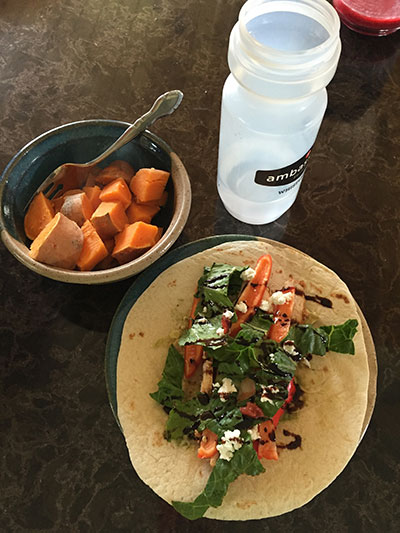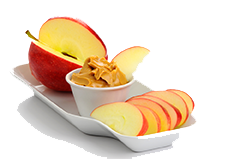
What is food-first nutrition?
Every athlete wants to reach their peak performance, which often means pushing harder and longer in training and in competition. In the quest to reach their maximum potential, many athletes know that good nutrition is critical, but they may also look to the latest supplements and trendy diet regimens to give them that extra boost.
Some athletes, on the other hand, have found that a food first approach is all they need to achieve peak performance. While some athletes may need to supplement their dietary intake because of a medical condition, many athletes can properly fuel their bodies and meet all their bodies’ needs with the right food.
In the Food-First Nutrition series, Olympians, Paralympians, and elite athletes share how they maintain the strength and energy they need to compete at the highest levels of sport through a food first approach.
From Erin: My Go-To Lunch

For athletes, it’s really important to stay fueled throughout the day with the right foods. That makes lunch a big deal for me…and I’m a sucker for a good sandwich or wrap! If I feel like I’ve had a lot of bread recently, I will turn it into a big salad instead, which just means that I sub the bread for greens like baby spinach, arugula, or kale.
THE SCIENCE: Based on standard estimates, and depending on the training routine, athletes should consume at least 50 percent of their total calories from carbohydrates. An athlete’s carbohydrate intake should be between 2.5-6.0 grams per pound of body weight, but longer training times require a higher number of grams. Learn more about The Master Fuel: Carbohydrates
A typical lunch for me, especially while training, would be grilled chicken breast, sliced up on some sort of natural multi-grain bread or wrap, topped with hummus or mayo, leafy greens of some sort, peppers, avocado, tomato, cucumber, and a thin slice of cheddar cheese or a sprinkle of goat cheese or feta. I try to cram as many veggies on there as I can! Sometimes I will have fruit on the side too, usually, an apple, banana, or berry combo.
THE SCIENCE: A diet rich in carbohydrates increases endurance performance because of the extra store of carbohydrates in the muscles and liver, called glycogen. Studies have shown that athletes who do not consume a diet high in carbohydrates on a daily basis may experience chronic fatigue and poor performance. It’s especially important for endurance athletes to replenish carbohydrate stores, especially during periods of intense training. Consuming carbohydrates during workouts over one hour can also support performance and delay fatigue. Learn more about Protein’s Role as a Team Player..
 If I need some extra protein or calories, I will usually throw peanut butter on the apple or banana, or have a hard-boiled egg on the side too. On salad days, I throw the egg right in! The lunch pictured above included a sweet potato on the side and a balsamic glaze for dressing, so those ingredients are in the regular rotation as well!
If I need some extra protein or calories, I will usually throw peanut butter on the apple or banana, or have a hard-boiled egg on the side too. On salad days, I throw the egg right in! The lunch pictured above included a sweet potato on the side and a balsamic glaze for dressing, so those ingredients are in the regular rotation as well!
For every meal, my main goal is to build a plate with as many colors and natural, wholesome foods as possible! I’m a firm believer in balancing foods out according to personal needs rather than completely omitting anything.
THE SCIENCE: Dietary intake requirements should reflect a wide range of factors, including an individual’s energy expenditure, metabolism, and health status..
For more nutrition recommendations for athletes, check out the TrueSport Nutrition Guide.

About Erin Hamlin



